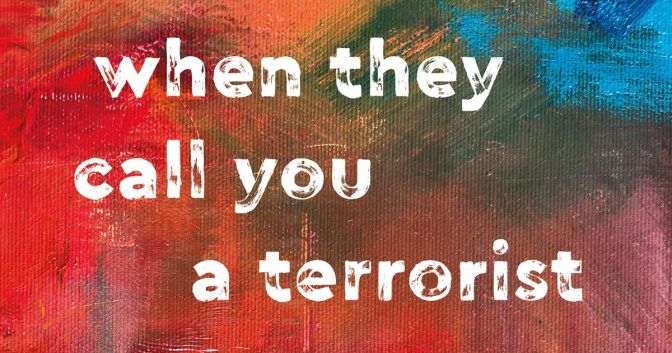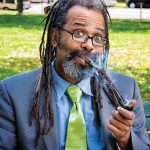Review: ‘When They Call You a Terrorist: A Black Lives Matter Memoir’

This book is powerful, maddening, joyous, sad, romantic, uplifting, humble, honest and true. Patrisse Khan-Cullors (with asha bandele) does a fantastic job telling her amazing and yet all too typical story.

Author Patrisse Khan-Cullors
Amazing, because this young, black and queer woman has managed to create a community full of love, respect and activism in a world not created for her. Typical, because the harassment and abuse she and her family have suffered at the hands of overzealous law enforcement officials, underfunded and overwhelmed social programs, and abusive prison authorities happen to black and brown people every day.
When They Call You A Terrorist: A Black Lives Matter Memoir (St. Martin’s Press) is not a long read, but it took me a while to finish, mostly because I had to stop occasionally to process and think about the many points the authors make. Like how, in the aftermath of the Columbine shootings in 1999, it wasn’t predominantly white schools like the one she attended that installed metal detectors, even though mass shootings are much rarer in predominantly black schools. Like how the young men in her neighborhood would be terrorized by the cops and strip-searched on suspicion of minor infractions, even though the white weed dealer at her high school had no fear of getting arrested.
 EXCERPT: «At the time the drug war was launched, Black people stood, worldwide, atop a moral mountain. America—the world—knew it owed us for years of slavery and Jim Crow. And instead of doubling down on how to repair the harm, it made us the harm… our mothers and fathers and daughters and sons were criminalized for choices they made often out of absolute desperation and lack of any real options.»
EXCERPT: «At the time the drug war was launched, Black people stood, worldwide, atop a moral mountain. America—the world—knew it owed us for years of slavery and Jim Crow. And instead of doubling down on how to repair the harm, it made us the harm… our mothers and fathers and daughters and sons were criminalized for choices they made often out of absolute desperation and lack of any real options.»
One scene describes police coming into Khan-Cullors’ home without a warrant to arrest her activist boyfriend. He hadn’t broken any laws. How did the cops know where he was? His name wasn’t on the lease. It reminded me of when Chicago police assassinated 21-year-old Black Panther Party leader Fred Hampton, in 1969. How many young activists are targeted before they even really get started?
RELATED: Freedom Leaf’s Diversity in Cannabis Impact List
Khan-Cullors makes sure to recognize all of the activists she’s worked with, from Los Angeles to Ferguson to Florida. If readers are paying attention, they’ll pick up tips, techniques and planning strategies that will help them become not just better activists, but better people.
When They Call You a Terrorist should be required reading in high schools and colleges everywhere in America. As a longtime cannabis activist, it’s inspired me to keep going, to do more, to be better—not just for cannabis, but for social justice. America has changed and grown more than a little since the protests and riots of the ’60s, but as this book and Michelle Alexander’s The New Jim Crow demonstrate, some things haven’t changed much at all.
ALSO BY NGAIO BEALUM: Diversity in the New Marijuana Economy
If you enjoyed this Freedom Leaf article, subscribe to the magazine today!

